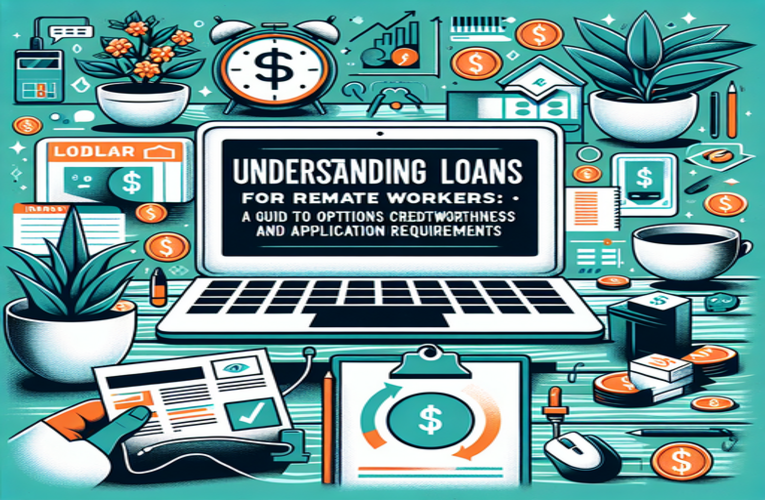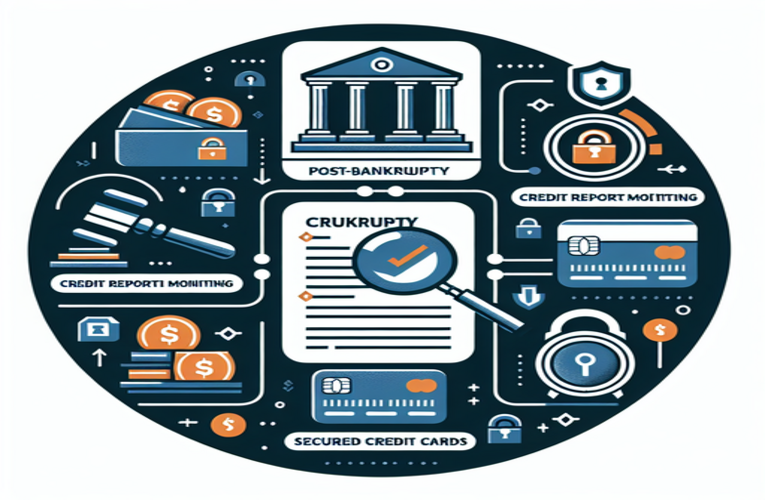Understanding loans for remote workers: a guide to options creditworthiness and application requirements
In today’s evolving job market, understanding the various loan and financing options available to remote workers has become increasingly important. With remote work participation expected to grow by 417% by 2025, navigating the complexities of securing loans and mortgages as a remote professional can significantly impact financial stability. This article aims to equip remote workers, freelancers, and telecommuters with essential insights into their unique financing challenges and opportunities.
Whether you are a seasoned freelancer or new to remote work, understanding how lenders assess your financial situation is crucial. We’ll delve into key considerations specific to remote workers, including the detailed documentation required for loan applications and strategies for improving creditworthiness. Additionally, we provide insights into specialized mortgage options tailored for remote employees. By fostering a comprehensive understanding of your financial ecosystem, you can improve your chances of securing favorable loan terms, ultimately paving the way for long-term financial success.
Table of Contents
Comprehending Loan Options for Remote Workers
Navigating the loan landscape presents distinct challenges for individuals engaged in remote work, primarily due to the unique financial dynamics associated with flexible employment. Understanding loan options for remote workers—such as mortgage loans for telecommuters or financing solutions for remote professionals—is essential not only for obtaining necessary financing but also for fostering long-term financial stability. In an era where traditional office jobs are declining and remote work is becoming increasingly prevalent, it’s crucial to grasp how lenders evaluate applications from non-conventional earners. This awareness enables remote employees to better prepare for the loan application process and improve their likelihood of approval.
Key Considerations for Remote Workers
- Lifestyle Freedom: Remote workers benefit from the freedom to choose their living locations, granting access to diverse housing options. However, this flexibility can complicate the lending process, as frequent changes in address or unconventional living arrangements may raise concerns for lenders assessing stability.
- Financial Understanding: Autonomy in location necessitates a sophisticated understanding of financial processes, including knowledge of different loan types, interest rates, and tax implications across various regions. Remote workers must be proactive in managing their finances to present a strong financial profile.
- Documentation: Lenders typically require specific documentation to verify income and employment. Remote workers may face additional scrutiny, especially if self-employed or working for international companies. Providing comprehensive financial records, such as contracts, consistent pay stubs, and detailed tax returns, becomes essential.
Essential Documents
- Remote Work Letter: A formal letter from your employer that details your employment terms, including your job title, salary specifics, and the duration of your remote work arrangement. This letter serves as proof of steady employment and assures lenders of your income stability despite the non-traditional work setting.
- Income Verification: Includes documents such as tax returns for the past two years, recent pay stubs, and bank statements showing regular deposits from your employer. These documents provide concrete evidence of your earning history and financial reliability.
- Employment Contract: Providing a copy of your employment contract can further substantiate your position and terms of employment.
- Credit Report: Submitting a current credit report gives lenders insight into your creditworthiness and financial responsibility.
Mortgage Options for Remote Workers
Grasping the various mortgage options available is vital for remote workers aiming to secure financing for a home purchase. Lenders increasingly recognize the shift towards non-traditional employment, offering specialized flexible mortgage plans tailored specifically for remote professionals. These options take into account the unique income structures and employment verification challenges faced by remote workers:
- Competitive Interest Rates: Specialized loan programs for remote workers can offer rates comparable to traditional loans. Lenders may consider additional factors beyond standard income verification, such as a consistent payment history or substantial savings, to provide favorable rates.
- Customized Loan Programs: These programs enable individuals with non-traditional incomes, such as freelancers, contractors, and remote employees, to find financing solutions aligned with their financial objectives. For instance, some lenders offer bank statement loans, which assess income based on bank deposits rather than traditional W-2 forms.
- Non-Qualified Mortgage Loans (Non-QM): Designed for borrowers who may not meet the strict criteria of conventional mortgages, these loans consider alternative documentation and can be ideal for remote workers with fluctuating income streams.
- FHA Loans: The Federal Housing Administration offers loans with more lenient credit requirements and lower down payments, which might be suitable for remote workers with modest savings.
Effective communication with mortgage professionals who understand the complexities of remote employment is essential. Engaging with a lender experienced in working with remote workers can simplify the application process, as they can provide guidance on the best loan products and help you gather necessary documentation. This interaction empowers you to thoroughly understand your unique circumstances, ensuring you make informed decisions that align with your financial goals.
Importance of Continuous Education
- Current Trends: Staying informed about the latest developments in the lending sector—such as changes in interest rates, new loan products, and underwriting guidelines—can significantly enhance your position as a borrower. Understanding how the rise of fintech lenders has created more opportunities for remote workers can help you find suitable loan options.
- Lenders’ Adaptation: As the remote workforce continues to grow, lenders are becoming increasingly attuned to the needs of remote workers, offering products that may have previously been outside their standard range. This includes accommodating various income verification methods and considering the stability of remote employment in their risk assessments.
Armed with this knowledge—including staying updated on industry trends and understanding the loan products available—you can significantly augment your chances of securing favorable loan terms. This proactive approach enables you to invest in a property that aligns with both your lifestyle and financial aspirations, ensuring long-term satisfaction with your investment.
Improving Creditworthiness for Remote Workers
In today’s financial landscape, remote workers face unique challenges when applying for loans and mortgages due to non-traditional income verification and employment structures. Understanding mortgages and financing options specifically designed for remote workers is essential for enhancing creditworthiness and improving the chances of loan approval. By proactively addressing potential concerns lenders may have, remote professionals can position themselves as reliable borrowers.
Key Steps to Enhance Creditworthiness
- Curate Impeccable Financial Documentation: Include comprehensive proof of income, such as a well-crafted remote work letter, detailed pay stubs, tax returns, and bank statements. Demonstrating a steady income stream reassures lenders of your financial stability despite the unconventional nature of remote employment.
- Explore Flexible Mortgage Options: Investigate loan programs tailored for distinct employment scenarios, such as bank statement loans, no-documentation mortgages, or loans for self-employed individuals. These options can improve your chances of obtaining favorable terms by accommodating alternative income verification methods.
- Maintain High Credit Scores: A high credit score is essential for securing advantageous loan conditions, including lower interest rates and better terms. Regularly monitor your credit reports, address any discrepancies promptly, and maintain good credit habits, such as paying bills on time and keeping credit utilization low.
Financial Documentation Details
Lenders typically seek:
- Remote Work Letter: This should detail:
- Your employment classification (e.g., full-time, part-time, contractor, freelancer)
- Length of time working remotely and with the current employer
- Current salary or pay rate and payment frequency
- Confirmation of employment stability and likelihood of continued employment
- Tax Returns: Providing your tax returns for the past two years helps establish a history of income.
- Bank Statements: Recent bank statements showing consistent deposits from your employer support your income claims.
- Proof of Assets: Documents demonstrating savings, investments, or other assets can strengthen your application.
- Profit and Loss Statements: If you’re self-employed, providing detailed profit and loss statements can illustrate your business’s financial health.
Strategies for Credit Score Improvement
If your credit score fluctuates due to freelance income, consider the following:
- Diligent Budgeting: Keep track of your finances by setting a strict budget and monitoring expenses. Use financial management tools or apps to stay organized.
- Consistent Financial Commitments: Ensure punctual loan repayments, credit card payments, and other financial obligations to build a positive payment history.
- Reduce Debt Levels: Paying down existing debts can lower your debt-to-income ratio, making you a more attractive borrower.
- Avoid Opening New Credit Accounts: Limit new credit inquiries, which can temporarily lower your credit score.
- Check Credit Reports Regularly: Review your credit reports for errors or inaccuracies and dispute any discrepancies you find.
Managing Debt-to-Income Ratio
| Aspect | Ideal Ratio | Explanation |
|---|---|---|
| Debt-to-Income Ratio | Below 36% | Indicates capability to manage monthly debt effectively |
| Credit Utilization Ratio | Below 30% | Shows responsible use of available credit |
| Payment History | 100% On-Time Payments | Reflects reliability in meeting financial obligations |
Proactively communicating with your lender about your financial situation allows you to address any potential concerns upfront. By showcasing a responsible approach to your finances—such as highlighting consistent income, low debt levels, and a strong credit history—you enhance your appeal as a candidate in the mortgage market. Open dialogue can also help you understand what specific steps you can take to improve your chances of approval.
Navigating Complexities
By diligently preparing and implementing these strategies, remote workers can successfully navigate the complexities of securing loans and mortgages. Understanding the unique challenges and proactively addressing them positions you as a competent and reliable borrower. This approach not only enhances your ability to secure financing but also contributes to long-term financial health, enabling you to achieve your goals of homeownership or other significant investments.
Essential Documentation for Loan Applications as a Remote Worker
Understanding loans for remote workers demands meticulous preparation, particularly regarding the necessary documentation to ensure a seamless approval process. Lenders require clear evidence of income stability and employment status, which can be more complex for those outside traditional work environments. Key to this effort is the remote work letter, which verifies your employment status and income, aiding lenders in assessing your financial situation during the underwriting phase. In addition to the remote work letter, assembling a comprehensive portfolio of financial documents can significantly streamline the loan application process.
Key Components of the Remote Work Letter
- Terms of Employment: Clearly state your eligibility for remote work, outlining the specifics of your arrangement. This provides clarity to lenders regarding your job structure.
- Duration of Remote Work: Indicate how long you have been working remotely. A longer duration signals a stable work arrangement, reassuring lenders.
- Salary Details: Include specifics about your compensation to furnish the lender with an accurate assessment of your earnings.
- Employment Classification: Specify whether you engage in full-time or part-time employment, as this distinction can affect income stability and loan eligibility.
- Official Company Letterhead: Ensure the letter is printed on official letterhead to bolster its credibility.
Additional Documentation to Gather
- Pay Stubs: Submit recent pay stubs covering the last few months to demonstrate consistent income.
- Tax Returns: Provide tax returns for the past two years to show a history of earnings and compliance with tax obligations.
- Bank Statements: Offer bank statements from the past six months, highlighting regular deposits and healthy account balances.
- Employment Contract: Include your employment contract to substantiate the terms of your employment and remote work agreement.
- Proof of Assets: Provide documentation of assets such as savings accounts, investments, or property ownership to strengthen your financial profile.
This supporting paperwork offers a comprehensive depiction of your financial health, enhancing your likelihood of receiving favorable loan terms. By presenting detailed financial records, you demonstrate transparency and reliability, which are critical factors in lenders’ decision-making processes. Consistently demonstrating your income over time reassures lenders about your financial reliability and reduces perceived risk associated with your loan application.
Open Communication with Your Lender
Clear and open communication with your lender is paramount for remote workers navigating the loan application process. By discussing your unique employment situation upfront, you allow the lender to provide tailored advice and anticipate any potential issues. Establishing rapport can facilitate a better understanding of their documentation requirements and expectations, thereby reducing potential roadblocks. Proactively ensuring that you meet all standards and providing any additional information requested will significantly contribute to a smoother mortgage application process and increase your chances of approval.
Being organized and well-prepared empowers remote workers to leverage the advantages of their flexible work setup while successfully managing the path to homeownership. By thoroughly understanding loans for remote workers, diligently gathering required documentation, and maintaining open communication with lenders, applicants significantly increase their chances of securing necessary financing with confidence. This proactive approach not only simplifies the application process but also positions remote professionals favorably in the eyes of lenders, enabling them to achieve their financial and lifestyle goals.
Summary
Key Insights for Remote Workers on Loans and Mortgages
As a remote worker in an evolving job market, understanding loan options for remote employees is crucial for financial stability. Here are the vital takeaways:
- Loan Landscape Challenges: Remote professionals face unique challenges due to non-traditional income sources, and securing financing requires awareness of how lenders evaluate remote work arrangements.
- Essential Documentation: Prepare a Remote Work Letter detailing your employment terms, alongside income verification documents (such as tax returns and pay stubs) to strengthen your loan application.
- Mortgage Solutions: Explore tailored mortgage plans with competitive interest rates that accommodate the flexible employment scenarios common among remote workers.
- Enhance Creditworthiness: Maintain a strong credit score by keeping organized financial records, budgeting effectively, and making timely loan repayments.
- Debt-to-Income Ratio: Aim for a ratio below 36% to demonstrate your ability to manage finances responsibly to lenders.
- Continuous Financial Education: Stay informed about the latest lending trends, as financial institutions are increasingly adapting their loan products to meet the needs of remote employees.
Effective communication with your lender can simplify the process, ensuring you are prepared to leverage your unique remote work arrangement towards home ownership. Being organized enhances your chances of securing favorable loan terms.
Frequently Asked Questions
What are the best practices for creating a remote work agreement letter?
When drafting a remote work agreement letter, ensure it includes comprehensive terms of employment, the specific duration of remote work arrangements, accurate salary and compensation details, clear employment classification (such as full-time or part-time), and is printed on the official company letterhead to enhance credibility and legitimacy. Additionally, outlining expectations regarding communication, performance metrics, and equipment provision can further solidify the agreement.
How can remote employees enhance their overall financial literacy?
Remote employees can boost their financial literacy by participating in financial workshops, reading books and articles related to personal finance, following reputable financial blogs, and enrolling in online courses that focus on budgeting, credit management, investment strategies, and retirement planning. Utilizing financial management tools and seeking advice from financial advisors can also contribute to a stronger understanding of financial principles.
What impact does having non-traditional income have on mortgage and loan applications?
Having non-traditional income, such as earnings from freelance work or multiple income streams, can complicate mortgage and loan applications. Lenders may require additional documentation to verify income stability, including records from various income sources, contracts, and a consistent history of earnings. Demonstrating reliable and diversified income can help mitigate concerns about income variability and enhance the likelihood of loan approval.
Are there specific lenders that cater exclusively to remote workers and freelancers?
Yes, certain lenders specialize in serving remote workers and freelancers. These lenders offer tailored mortgage and loan products that account for the unique financial situations of non-traditional earners. Features may include flexible income verification processes, consideration of multiple income streams, and customized loan programs that accommodate sporadic or fluctuating income patterns, making it easier for remote professionals to secure financing.
What strategies can remote workers use to manage their cash flow effectively?
Remote workers can effectively manage their cash flow by creating detailed budgets that track income and expenses, regularly monitoring financial statements, setting aside savings for taxes and unexpected expenses, and building an emergency fund to cover periods of irregular income. Additionally, using financial planning software and automating bill payments can help maintain consistent cash flow management.
How does a remote worker’s employment history influence their mortgage eligibility?
A stable and consistent employment history as a remote worker positively influences mortgage eligibility. Lenders prefer applicants who can demonstrate a steady income source over an extended period, even if the work is performed remotely. Maintaining continuous employment, avoiding frequent job changes, and providing comprehensive documentation of work history can enhance eligibility and reduce perceived lending risks.
What documentation should remote workers provide for income verification when applying for a loan?
Remote workers should prepare a robust set of income verification documentation when applying for a loan. This includes recent pay stubs, tax returns for the past two years, bank statements that reflect income deposits, and any contracts or agreements that provide proof of ongoing or future income. Providing comprehensive and organized documentation helps lenders assess income reliability and streamline the loan approval process.
Can part-time remote work affect one’s ability to secure a loan or mortgage?
Yes, engaging in part-time remote work can impact the ability to secure a loan or mortgage. Lenders evaluate income stability and overall earnings, and part-time positions may be seen as less reliable compared to full-time employment. To enhance loan eligibility, part-time remote workers should demonstrate consistent income from multiple sources, maintain a good credit history, and provide thorough documentation that highlights steady earnings despite part-time status.
How can remote workers build and maintain a strong credit history?
Remote workers can establish and maintain a strong credit history by consistently making timely payments on all debts, responsibly managing credit card usage, keeping credit utilization ratios low, and regularly reviewing credit reports for accuracy. Additionally, diversifying credit types, such as having both credit cards and installment loans, and avoiding excessive credit inquiries can contribute to a robust credit profile.
















